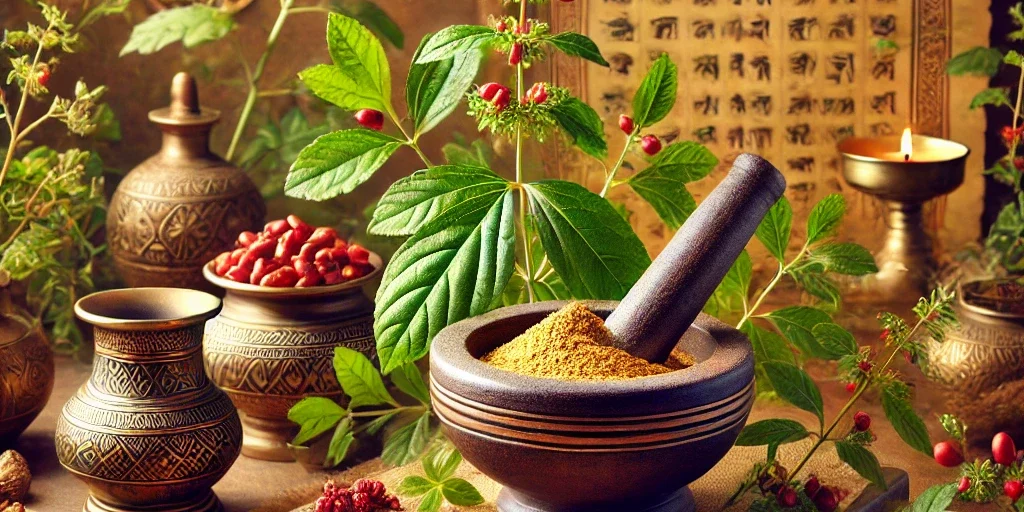Ashwagandha, also known as “Indian ginseng” or “winter cherry,” is a revered herb in Indian culture with a rich history that spans over 3,000 years. Its name translates to “smell of a horse,” referring to the herb’s distinctive odor and its ability to impart the strength and vitality of a horse. In Indian traditional medicine, particularly Ayurveda, ashwagandha holds a prominent place for its healing properties and is considered a Rasayana, or rejuvenator, helping to maintain youth, both mentally and physically.
Ashwagandha in Indian Culture and Tradition
In Indian households, ashwagandha is often seen as a household staple, passed down through generations as a natural remedy for a variety of ailments. Traditionally, ashwagandha is associated with balancing the body’s doshas (Vata, Pitta, and Kapha), promoting longevity and well-being. It is frequently used in rituals, ceremonies, and Ayurvedic treatments aimed at fostering mental clarity and spiritual strength.
In ancient scriptures, ashwagandha has been described as a “life-giving herb”, offering protection from diseases and enhancing vitality. It is often mentioned in Ayurvedic texts such as the Charaka Samhita and Sushruta Samhita, where it is recommended for improving energy, combating stress, and strengthening the immune system. For the Indian people, ashwagandha is more than just a medicinal herb; it embodies the spirit of natural healing and is a symbol of the deep connection between humans and nature.
Health Benefits of Ashwagandha
- Stress Reduction and Adaptogenic Properties: One of ashwagandha’s most popular uses is as an adaptogen, helping the body manage stress. It lowers levels of cortisol, the stress hormone, and helps to reduce anxiety and depression. Studies show it can be effective in lowering stress levels and improving overall mood.
- Improved Energy and Stamina: Traditionally used to boost vitality, ashwagandha enhances energy and reduces fatigue, making it an excellent supplement for athletes and those experiencing physical exhaustion.
- Cognitive Function and Memory Enhancement: Ashwagandha is known to enhance cognitive functions, including memory and concentration. It supports neuroprotection by preventing oxidative stress in the brain, making it beneficial for those at risk of Alzheimer’s or other neurodegenerative diseases.
- Supports Immune System: As a natural immune booster, ashwagandha strengthens the body’s defense mechanism, helping to ward off infections and diseases.
- Anti-inflammatory and Antioxidant Properties: Ashwagandha contains withanolides that exhibit potent anti-inflammatory and antioxidant properties. It helps reduce inflammation and neutralize free radicals, protecting cells from damage.
- Improves Sleep Quality: Known for its calming effect, ashwagandha promotes restful sleep, making it an excellent remedy for those suffering from insomnia.
- Hormonal Balance and Fertility: Ashwagandha is beneficial for reproductive health, aiding in balancing hormones and boosting fertility in both men and women. In men, it is often used to improve sperm quality and testosterone levels.
- Blood Sugar Regulation: It helps in regulating blood sugar levels, making it beneficial for people with diabetes or those who want to maintain balanced glucose levels.
Ways to Consume Ashwagandha
Ashwagandha can be consumed in various forms to suit different needs and preferences:
- Powder (Churna): One of the most traditional ways to consume ashwagandha is in powdered form. It can be mixed with warm milk and honey, especially before bedtime, to promote relaxation and improve sleep. Ayurvedic practitioners often recommend taking it in ghee (clarified butter) or water.
- Capsules and Tablets: Ashwagandha is also available in capsule or tablet form for convenient daily supplementation. This method is particularly useful for those who find the taste of the herb too strong or unpleasant.
- Tea: Ashwagandha root powder can be brewed into a tea. Simply boil the powder in water, strain, and drink. For added flavor, it can be combined with herbs like ginger or cinnamon.
- Ashwagandha Oil: The herb is also available in oil form, which is applied externally to the skin. It is commonly used in Ayurvedic massage treatments to relieve muscle tension and soothe the nervous system.
- Tinctures and Extracts: Ashwagandha extracts can be found in liquid tincture form, which can be added to water or juice for a quick and easy way to incorporate it into your routine.
- Edible Blends: Ashwagandha is sometimes mixed into health drinks, smoothies, or energy bars, combined with other superfoods for a comprehensive health boost.
Conclusion
Ashwagandha’s deep roots in Indian tradition and its holistic benefits make it a powerful herb for modern wellness. Whether it’s for managing stress, enhancing physical performance, or improving mental clarity, ashwagandha continues to be a trusted remedy. Incorporating ashwagandha into your daily routine not only connects you with ancient Indian healing traditions but also helps to maintain a balanced and healthy life.
